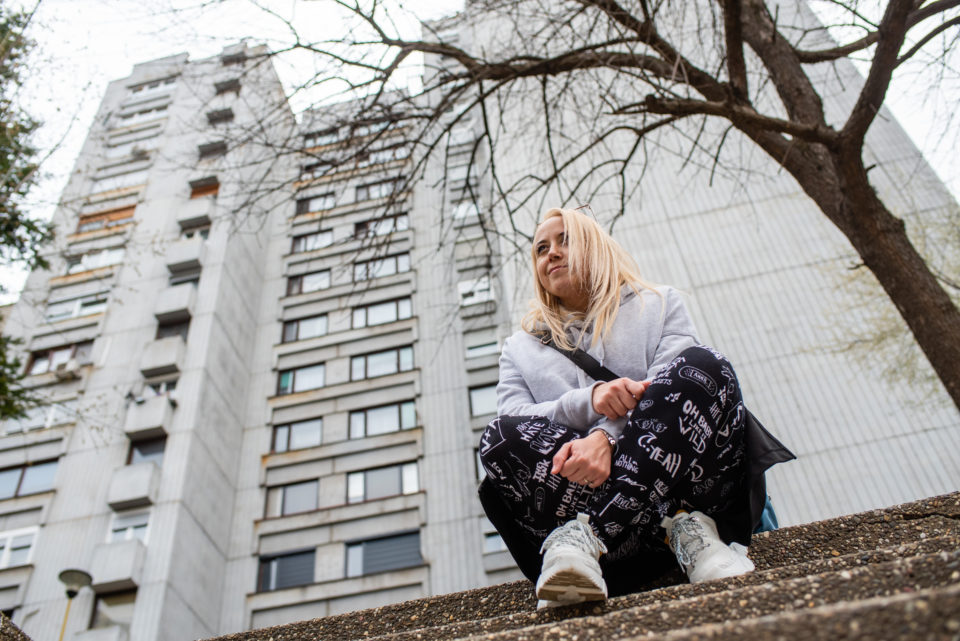
We know Sanela Halilović, “Sassja,” as the lady of the Bosnian rap scene, with a recognizable voice and attitude. In her private life, she is first of all a mother, then a graduate with a master’s in pharmacy, and a workaholic. She is someone who has a lot of energy and is constantly looking for positivity around her.
Sassja was born and grew up in Tuzla – a city known for its interculturality. She says that she did not think much about how Tuzla had influenced her, about its uniqueness, until she started traveling.
“I love Tuzla, but above all I believe in it. There are good and bad people everywhere, but there is simply a sense in Tuzla that your name does not matter at all. If the rest of Bosnia and Herzegovina were not as it is, Tuzla would not be written about as unusual. I didn’t think much about Tuzla in that way, until I started traveling and touring other cities in BiH,” Sassja tells us.
She tells me that interculturality is not imposed on you nor something you learn, it is simply how people live in Tuzla. She gladly points out that she celebrates all the holidays with her family and friends: “My friend had a new girlfriend and we all asked him who she was. Instead, he answered: She celebrates everything. Just like a true Tuzla girl.”
The city known for its urban culture and numerous bands inevitably influenced Sassja musically too.
“Maybe that’s why it affected me. I think that Edo Maajka once said that it is unbelievable that such a small town has so many rappers, break-dancers, song writers… Maybe now it is a little diluted, because we all found our way somewhere else, but at some point it really was so. Everybody is doing something and they are really good at it,” says Sassja.
She says that her mother is to thank for the beginnings of her music career. It was her mother who bought her a synthesizer on which she started learning notes and playing songs. Growing up, she says, it was not easy to get to new music as everyone just listened to what their parents listened to.

“At the time, I couldn’t know if Dino Merlin stole the song from Michael Jackson or vice versa. Who took it from whom? Those were the times! I was little, I didn’t know what was going on there. An older neighbor, Melika, used to play Michael Jackson for us. It was the highest quality music. I listened to everything: rap, rock, metal, whatever I could get my hands on. Nobody had to tell me who Bob Marley was,” recalls Sassja.
In the absence of music and material for creating new sounds, Sanela would record and compose music by using bits and pieces of Michael Jackson’s songs. She was in elementary school when she started creating new beats and sounds for herself.
“My playtime included playing synthesizer, singing, writing. At that time, I still didn’t know about rap. I also wrote poetry. Once at school we had homework to write a poem about our mothers, which I did, and I quite liked it, and then I started writing poems about everything,” she recalls.
Her other great love is graffiti, which she became familiar with for the first time in elementary school. After seeing a friend draw something on the table, Sanela, being a curious child, immediately started drawing graffiti in her notebook. Walking through the city, she began to notice graffiti on buildings, but she did not like it. Only years later would she understand why.
Later in high school, I would meet a guy who drew graffiti, and only then would I find out that it is illegal, and that is why they are so ugly – they are always in a hurry, so no one sees them drawing on buildings. Later I started to draw them, but in legal places,” she says.
Regarding Sanela’s personal development, she highlights two things that shaped her and directed her on the right path while growing up: Telex, the Tuzla Youth Center, and positive role models like local artists, Defence and Edo Maajka. Without them, she says, she could have very easily ended up “on the streets.”
“We started gathering there and my mother took me to English classes there too. They even had computers. Then I saw that some bands had rehearsals there, so I learned to play the guitar at Telex. At the same time, I went to the Youth Theater, where we acted in the play I will wait for you. Later, the Tuzla Youth Theater opened. Although I almost ended up on the street, the theater directed my creativity to the right track. I knew what I needed to do and what I needed to not do to be one of the socially engaged young people. I hung out in Telex, played, sang. But I always knew where the limits were, so I would be given the opportunity to be in that play I really wanted to be in,” says Sassja.
The discovery of Defence and Edo Maajka was important for the beginning of her music career, leading to her recording her first song, which she paid for in three loan installments.

“At FM JAM I first heard Edo Maajka and I stuck to him. Then I heard about Defence, and boom! Their gigs, that kind of madness, the silence, hugs, then the reggae sound, were all things I started to make sense of. As I hung out with these rockers here, the only logical thing was to make a real reggae band. However, I didn’t know how difficult it would be to gather people who both wanted to do it and knew how to do it. So, we’d rehearse the first, the fifth time, this one can do it, this one can’t, this one doesn’t know, and then I wrote the lyrics… and then I discovered the Internet. I found reggae instrumentals which could be downloaded for free. Then I was told about a studio nearby, and that it only cost 50 Bosnian Marks to record. So I did it. I recorded my very first song “Leave it burning” (original title: Ostavi da gori). I paid for it in three loan installments. There just wasn’t a lot of music I could listen to so I made my own music,” recalls Sassja.
When they played Sassja’s first song in the famous Tuzla cafe Sloboda, she could not hold back her tears of emotion.
I uploaded my first song on the internet. About ten days later, it happened that Defence was performing in Sloboda so of course I went, only to hear them play my song. I just froze. DJ Soul playing my song. I just stood there crying. I went there with my friends to enjoy the gig and they played my song. Unfortunately, that was the last Defence concert in Tuzla.”
The Sassja we know today is part of the FM JAM music movement, which has been working on the promotion of music and culture since its inception in 1999. They are based in Tuzla.
“FM JAM is a new culture. FM JAM is full of different people, but we have something in common. I can’t describe it. We just see it in some of the people who come and talk to us. We simply know when we feel that spark in others. It’s like ‘Oh yes, he is one of us’,” says Sassja.
She emphasizes how only men played her kind of music at the beginning of her career. But if she had been discriminated against at all in that environment, she would not be where she is today.
“There is a slight kind of bias, but I don’t think it’s intentional, because when I started, it really was only men that were involved in this music,” she says.
Sassja announces her plan and desire to return to her reggae sound, although she points out that it is not easy at all, because she is the first woman to do it in BiH. “I think people are ready for that music genre now,” she says with joy, because, as she says, it was reggae that made it all happen for her.






